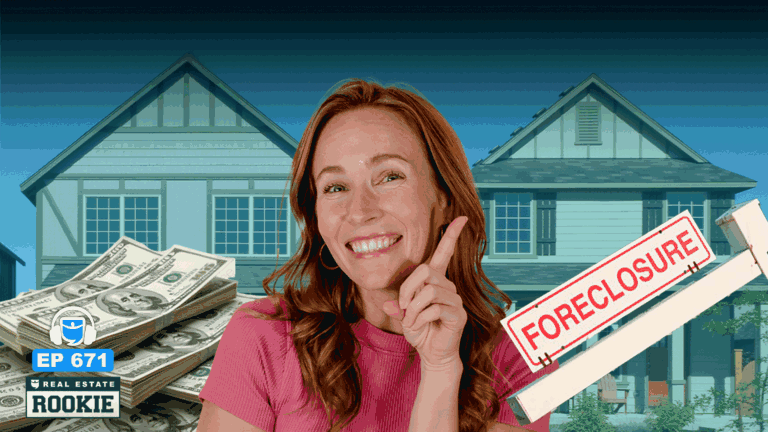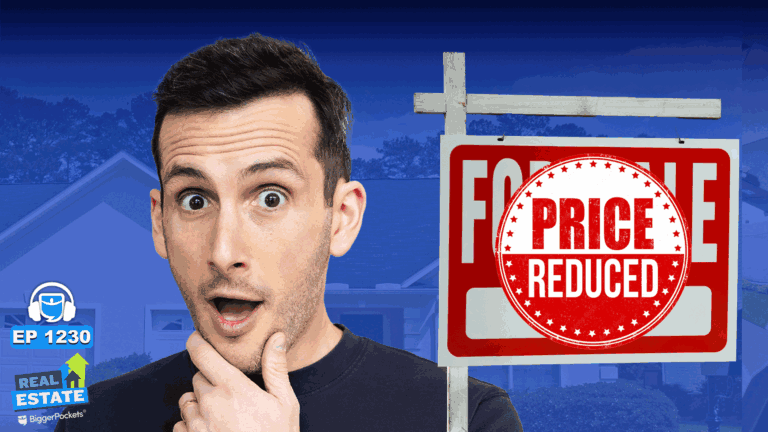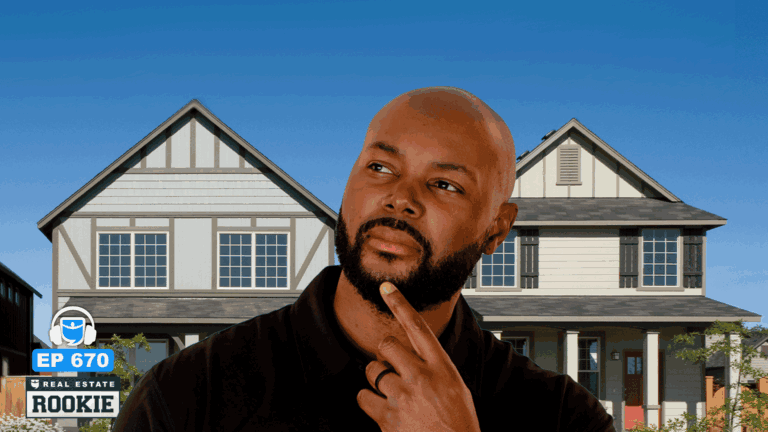Ashley:
What if the cashflow number you’re chasing is actually holding you back from getting your first deal? Today we’re breaking down the real math behind minimum cashflow, why it matters and when it doesn’t.
Tony:
We’ve also got a question that stops a lot of rookies in their tracks, should you buy an investment property before you buy your primary home? Plus, we’ll tackle how to build a rock solid out-of-state investing team when you’re totally brand new.
Ashley:
This is the Real Estate Rookie podcast. I’m Ashley Kehr.
Tony:
And I’m Tony j Robinson. And with that, let’s get into today’s first question. Alright, today’s first question comes from John in the BiggerPockets form and John says, as the market is changing and I’m seeing in my market that more houses are producing lower cashflow, what would be your minimum cashflow that you’d like to see from an investment? I know that there is a lot to consider, but if cashflow really is king, would you be okay with a $150 a month cashflow in a growing metropolitan area? We’re seeing different versions of this question I think pop up a lot recently around can we still get cashflow? How much cashflow should I take? What’s good cashflow versus what isn’t? I think that there’s a lot that goes into this and I’m curious for you, Ash, what’s your take on it as well? But I think the good cashflow can vary a lot depending on the person, depending on how much capital you put into that deal, depending on so many different factors.
So to boil it down to say, is it good or is it bad a thing? Is it a little difficult? Funny enough you say one 50 because that was the actual cashflow. My very first deal that I ever did, that first long-term rental that I bought in Shreveport, Louisiana, my cashflow after everything, property management vacancy CapEx, was 150 bucks per month. To me, that was an amazing deal because I had $0 in that property. I literally had $0 into that deal, so I had an infinite return. So for me, 150 bucks, I had a pm, maybe it took me a couple hours a month to deal with the pm, but it was 150 bucks and basically free money that I was getting. I had a tenant paying down the mortgage. It wasn’t a super strong appreciating market, but still there was some level of appreciation. So for me, one 50 was great. So that’s how I would approach it like, well, what am I putting into it? How much time is it involving? Am I getting any other ancillary benefits? But what’s your take ash?
Ashley:
Yeah, the last thing I would add is what else could you do with any money invested into the property or with your time that you’re going to be putting into managing this property and really seeing if there’s a better opportunity for you? But I think that can also get you stuck in analysis paralysis where you becoming too concerned about getting the best and the greatest return on your first deal. That first deal is going to bring you so much value by propelling yourself into your real estate investing journey.
Tony:
I think it’s also important to understand what kind of market you’re buying in. Are you buying in a market that’s meant for high cashflow or are you buying in a market that’s meant for maybe more appreciation? And if your main focus is just maximizing cashflow, then yeah, maybe 150 bucks a month isn’t enough for you and you need to go into a market where you can maybe extract more on a monthly basis. But if you’re buying in a market like where I live in southern California where appreciation historically has been really, really high, then 150 bucks a month is probably pretty good if you know you’re going to gain eight, 10% a year in appreciation or something to that effect. So I think the market types in managing those expectations is important. But the other thing Ashley, I think is, and John didn’t really specify here, but when he says 150 bucks per month in cashflow, is that true net cashflow or are you just taking gross rent minus your mortgage and calling that cashflow?
Because in addition to just your mortgage and whatever other kind of ancillary property expenses you, you still have to account for things like potential vacancies, repairs and maintenance CapEx, and if your one 50 doesn’t include those, that I would assume that once you start adding those things in, you might be barely breaking even or potentially negative. So at that point, I think generally speaking, probably not going to recommend that anyone does that deal If you’re actively losing money every single month on a property, there are probably some unique situations where it does make sense, but in a general sense, usually we don’t want to be negative on a deal. So I think also looking at are you actually calculating the true net net cashflow? And guys, this is why the BiggerPockets calculators I think are so helpful because it forces you to make sure you’re accounting for all of those things that a lot of Ricky Investors might miss. Ashley, I guess one last question for you on this one, how important do you think cash reserves are when determining the type of cashflow that you’re willing to accept?
Ashley:
Are you saying how much you should have saved before
Tony:
Not quite
Ashley:
Deal? What do you mean?
Tony:
Yeah, so I guess when I think about 150 bucks per month, if your water heater goes out and say it’s only been running for six months at 150 bucks per month, you don’t even have enough to replace your water heater.
Ashley:
Well, I think that goes back to the true cashflow is one 50 after you’ve already accounted to saving 8% for repairs and maintenance going forward too, and cap CapEx saving for that. So I think that’s a big factor in how that compares. If you are already counting that you’re going to spend X amount every year anyways and repairs maintenance and capital improvements as to whether, but if you’re not in that one 50, that one 50 is going to be in up when you need that roof or that hvac and you’re going to end up, if you’re not accounting for those variable expenses, you’re going to realize a couple of years from now you actually have negative cashflow on that property.
Tony:
And I guess that’s where I was taken is if you’re jumping into this deal and maybe you use all of your extra cash on actually acquiring the property and you don’t have enough set aside for some of these surprise expenses, even if you’re setting money aside on a monthly basis for CapEx and reserves, if something big happens in month number three, you probably haven’t set aside a whole heck of a lot. And if you don’t have any excess funds, then yeah, 150 bucks per month is definitely not enough. So I think there’s also a discussion around, or at least you should take into account how much reserves you have going into the deal to weather some of these storms because I think it does make a difference
Ashley:
Up next, should your first move to be buying an investment property instead of your own home. A lot of rookies think this shortcut gets them ahead. We’ll break it down right after this. We just talked about minimum cashflow and now we’re moving into a decision a ton of rookies wrestle with. So this question is from the BiggerPockets forums and it says, Hey everyone, I am weighing the options between buying an investment property before a primary. I am still staying at home. My girlfriend has one more year of law school, and then we’ll stay with my parents for one year before looking to buy our primary home with joint income so she can have a year’s income at least to show I have a real estate mentor who is helping walk me through the whole process. Nothing crazy on top of all this, I will still be working and saving.
Should I look to dive into a rental property or just wait to buy one after we get our primary? I feel it’s better to start building the foundation early. I totally agree with that. It’s better to start now than to wait, and it doesn’t necessarily mean starting with a rental before, starting with your primary. One thing that I noticed that I want to call out is saying that he wants to wait for his girlfriend to have one full year of income before going and purchasing their primary. My sister literally graduated college, had an offer letter to work part-time, not even full-time, and she got approved for an FHA loan to purchase a property on her own. So I don’t necessarily think you need to wait.
Tony:
Yeah, my very first investment deal, I talked to that lender earlier in the year. I did not get approved for anything. I got a new job offer in the middle of that year with a totally different company. It wasn’t in the same company, a completely different job. And same with that offer letter. They said, okay, cool, we can approve you based on this offer letter. I hadn’t even started the job yet and I was able to get approved. So yeah, I mean, I agree with you that you don’t have to wait the full year.
Ashley:
So I guess his question comes up too is should he buy the rental property or wait till after the primary? And I think this really comes down to what you can do. So if you’re able, you have the capital, you have the time to buy a rental property now and still have enough capital to buy your primary, yes, go ahead. I actually think that the best thing to do is to buy a small multifamily, a duplex and live in one side and rent out the other side. And then you are accomplishing both of these things. You’re going to get better financing than you would for an investment property because you’re going to be living there and you’re already used to living with people because you’re living with your parents. So at least you’d get your own side of the duplex possibly. Or you could do rent by the room in a property too. So I know everyone’s sick of talking about house hacking, but I think this would be a great scenario to combine getting your primary and to have your first investment property.
Tony:
Yeah, couldn’t agree more. Ash, you hit the exact point that I was going to make is that it doesn’t have to be either or just make it an and go do both and then maybe you buy one today and then when your wife does finish law school and she’s got this new attorney degree or career, then you go out and buy another one that’s a primary residence. And even if you guys just stay on that same cycle of buying one new property every year for the next 10 years as your primary in a decade, you’ve got 10 properties with really good long-term fixed debt that are hopefully cashflowing pretty well. We keep referencing back to this episode, but Matt Krueger, I can’t recall the exact episode number, but if you just search YouTube for Matt Krueger and Real Estate Rick, you’ll find his episode. But that was his exact strategy every year he just bought a new primary residence and then rented out the old one, and that stacks up over time.
It seems like you guys are young, didn’t mention anything about kids. So you’ve probably got a certain level of flexibility that might get harder as you kind of start to mature in life and responsibility. So I love the idea of doing both. I think, and to your point, Ashley, you said this earlier, if you do want to separate them, just making sure you have enough capital. But I think the other piece too is keeping close tabs on your DTI, just to make sure that if you guys do buy the rental today, will you have enough in terms of debt to income ratio? Will you have enough room there to still get qualified for that primary down the road or where there may be some challenges there? And again, I think working with a good lender, they’ll be able to answer that question for you. But I agree, Ash, I think waiting the best time to buy a real estate deal is yesterday, and then the second best time to buy a real estate deal is today.
So if you guys have the right deal, if you guys have the right resources right now, pull the trigger and then take the next steps to figure out how you guys get the primary from there. Alright, so coming up, if you’re going out of state for your first deal, who do you hire first and how do you know you’re not being taken advantage of? So stick around and we’ll answer those questions right after we’re from today’s show sponsors. Alright guys, let’s jump back in. We’ve talked about cashflow. We’ve talked about whether you should buy a primary or a rental first, and now we’re diving into one of the biggest sticking points for rookie investors and that’s building teams out of state. So this next question comes from Kevin in the BiggerPockets forum and Kevin says, I’m looking to buy my first rental property. I live in California.
I feel like we’ve been getting a lot of these. I live in California types, I live in California and want to buy out of state. I’m a buy and hold investor looking to buy a small single family home that at most needs major cosmetic work done. My questions to all of you is how do you go about building a team and in what order do you recommend doing those things? For example, should you find a real estate agent before or after finding a house you want to put an offer on? Do you hire a property management company before or after you purchase a property? Will an agent and property management company help you find good deals? Any other suggestions you can offer as a beginner would be appreciated? Alright, I bought my first rental property exactly fitting this story. It was a single family home, mostly cosmetic renovations, and it was, I dunno, 2000 miles away from where I lived.
I’ll tell you my experience and what sequence of events I followed, and then we can go from there. But for me, I actually found my lender first, which is not I think the most standard way, but that was the approach that I took. I found a lender in that market first who offered a really, really unique and just really compelling loan product for real estate investors. The lender then introduced me to an agent and then I did my own research, but between the agent and my lender, I also found a general contractor. They both have their list of recommendations and one person was on both of those lists that ended up being my general contractor. And then I just did my own research and met with a bunch of different property managers in that market. But my sequence was lender. The lender kind of gave me the buy box of what I needed to purchase in that market to fit the requirements of their loan.
I then went to the agent and said, Hey, here’s the buy box that the lender just gave me. Help me find something. Once I found the deal, I then had the general contractor who came in to kind of vet and make sure the scope of work was lined in and they handled the rehab and the PM came in. Actually before I closed, I had been chatting with them, but I didn’t actually hire them until we got close to the end of the rehab. And then they were the ones that were kind going through near the end of the rehab to make sure the blue tape and putting everything like, Hey, fix this, fix this, because they were going to take over the management. So they actually helped me finish off the rehab to make sure it was rent ready. And then when the rehab was done, the GC literally took the keys, drove them over to the property manager’s office and said, Hey, here you go. And the PM took it from there. So that was my sequence of events. Lender, agent, contractor, and then pm.
Ashley:
Yeah, I guess for me it was a little bit different because I was working as a property manager, so I knew going into it that I was going to self-manage the property, but I just think BiggerPockets just has so many resources to find these team members that before you even find the deal, if you know what market you’re looking in, you can connect with an agent, a lender, an insurance agent, all of these people to help you get the deal. I do think it is important to know that there are least options. So this can go for long-term rentals or short-term rentals. I think, Tony, you’ve mentioned that in one of the markets you invest in and it was harder to find cleaners because it wasn’t as populated or it was very much just short-term rentals. So there wasn’t a lot of people. I think maybe even your hotel even that it’s more of a tourist destination that it’s hard to find people to work.
So I think there is some element where you need to at least do some research to make sure you can find team members and that there is a wide variety of selection. So that maybe if the first property manager doesn’t work out, you know that there’s another one in the area that you can go to. So biggerpockets.com/teams is where you can find all of your market specific team members and you can talk with them them. We always recommend asking questions to ’em, not in the form of do you work with investors, but how many? So not asking yes or no questions, but actually having questions where they have to give you some information as to verify what they’re doing instead of them just being able to say yes and maybe only one investor they actually work with. So
Tony:
I guess on that note, actually, let’s maybe talk about red flags that you might see from an agent or even a potential contractor. On the agent side, I think one red flag is if you ask that agent questions that anyone who works with investors should probably be able to, I guess even before that, the first question that you should ask, and we talked about this before, is ask that agent what percentage of their transactions last year involved real estate investors as their clients? And if it was like 1%, maybe that’s not the right agent for you to work with, but if it was like 50 plus percent or 90% or Hey, I only work with investors, that’s someone who’s going to understand what it’s really like and what you are focused on as an investor. When we buy our primary residence, it’s very much an emotional transaction.
We’re raising our family here, we’re making memories here. We want to see ourselves having Christmas morning and Thanksgiving dinner and whatever it may be, and celebrating birthdays. When we’re buying an investment property, we are more so focused on the numbers. Is this going to work? Is it going to cashflow? Is it going to give me whatever it’s that I’m looking for on this deal? And an agent who really understands investing will be able to tell you, Hey, this is a really nice neighborhood, but I very rarely see things cashflow over here. And hey, this is an up and coming neighborhood where maybe it’s not an A class, but it’s a solid B class, but you can get much better returns in this market. Or, Hey, we actually don’t want to buy homes over here because there’s issues with flood insurance and none of my investor clients like buying here because it’s always hard to do that. So you want them to be able to give you those kind of insights that as an investor will allow you to make a more informed decision about what to buy. So those are maybe potential red flags to look out for. On the Asian side, Ashley, with any of the other team members, can you think of any other maybe red flags that you’re like, I don’t know if I want to work with that kind of person?
Ashley:
I’ll give you one recently for a lender as in a lender just giving you a disclosure. So this is where you fill out the loan application, you have your property under contract, you know what you’re going to buy, and the lender sends you a disclosure without discussing your options for the interest rate or telling you their fees upfront and they’re just sending it to you thinking you don’t know what you’re doing. So this was literally a disclosure I read the other day where they’re like, oh, great news. I locked you in at this percentage rate. I was like, oh, cool, that’s an awesome rate. And then I get the disclosure and it’s saying that I’m paying $3,000 in points for this interest rate. And I know when I’ve worked with other lenders, there is a table that tells you it’s like a scale, a sliding scale.
If you pay 5,000 in points, you can knock down 1% of interest. If you pay $500, you’re knocking off 0.01 of your interest rate. And that’s where I go and I say, okay, how long am I going to hold this loan for? Where’s the breakeven point where it makes sense for me to pay X amount? I’m going to hold the property for X amount of years, whatever this lender just put in what they thought was best. And they also included an underwriting fee that wasn’t discussed or negotiated ahead of time. And so I think make sure you are reading your disclosure and asking questions if you don’t know what those fees or those things are. There’s also, if you just Google loan disclosure estimate, if you just Google it, there’s a government website that literally goes line item by line item telling you what every single thing means on the loan estimate disclosure that you’re getting and what the fees are for. And you can find out this is a fee that is charged by the lender. This is something that is standard that you’re going to be charged no matter what. So I think when you’re working with a lender, how much are they trying to get by you? And it can lead with you asking the right questions upfront, what are your underwriting fees? Things like that. What are my options for points for interest rates, things like that too. So just on the lending side, those are some things to be cautious of.
Tony:
Yeah, those are all great points, Ashley. And just shopping. Just make sure you’re shopping any lender that you work with to see if not only just the interest rate, but the overall cost and the product that you’re getting. I think just last piece on just the red flags, I would say from a contractor, a general contractor’s perspective, we can probably do an entire episode on bad general contractors, but I think a few things to look out for. Number one, very similar to the agent, make sure that they’ve got experience actually working on investment properties because the contractor who is maybe just like a small time handyman that goes to people’s houses and fix their blinds when they fall down or kind of ran a little knickknacks, is different from someone who’s going to be able to do a four rehab. So I think understand the scope of their experience first.
You maybe don’t want to be their first Guinea pig of a full renovation project. And then also just do they actually work with investors? Because sometimes if you’ve got someone who just says, really high-end kitchen renovations for primary residences, they’re not going to be enough for you as a real estate investor to work with. And that was, I think part of my challenge is when we first started as well, is that I would just open up Zillow or not Zillow, open up Yelp and some of the businesses in there, they have great reviews, but they’re all focused on residential, like me as the homeowner and their pricing and their just entire business model is different than the contractors who work with investors. The ones who work with investors know they’re probably going to make a little bit less on a per job basis, but they’ll make that up because they’re doing it in a more volume, right?
I’m going to be a repeat client. You’re not going to do my kitchen once every 10 or 15 years. We’re going to do like 10 a year. So they know that they’ll make it up in volume. So understanding, I think just again, the breakdown of their client pool and how much of that is investor focused. And then just big one, if you are an outstate investor working with the general contractor one, try and get as many referrals as you can, and ideally, referrals that didn’t come or not referrals, references is what I really mean to say here. Try and get as many references as you can. And of course, any references they’re willing to provide the better. But if you can find maybe, I don’t know, from talking to other folks in the community agents, lenders, property management companies like, Hey, what have you heard about this general contractor?
And try and gets some references that way as well. If the PM’s like, oh man, you definitely don’t want to go with John Smith down there because I’ve heard nothing terrible things about him. And you talk to the local lender, they’re like, oh yeah, John Smith, he talks a good game, but he’s not worth his weight. But talk to other folks inside that community and see what their take is on that person as well, because it is easier, I think, as someone who’s not there in that market, and you don’t really have that finger on the pulse to maybe talk to someone who’s a smooth talker and you’re like, man, they’re saying all the right things, but then the project starts and it’s a completely different story. So just trying to do a little bit of homework, trying to do a little bit of research before you get into bed with these guys, I think will be really important.
Ashley:
Thank you guys so much for joining us today. I’m Ashley. He’s Tony, and if you guys have a question, leave it in the BiggerPockets forums or you can DM us on Instagram at Wilford Rentals or at Tony j Robinson. Thanks so much for joining us. We’ll see you guys next time.
Help us reach new listeners on iTunes by leaving us a rating and review! It takes just 30 seconds and instructions can be found here. Thanks! We really appreciate it!










